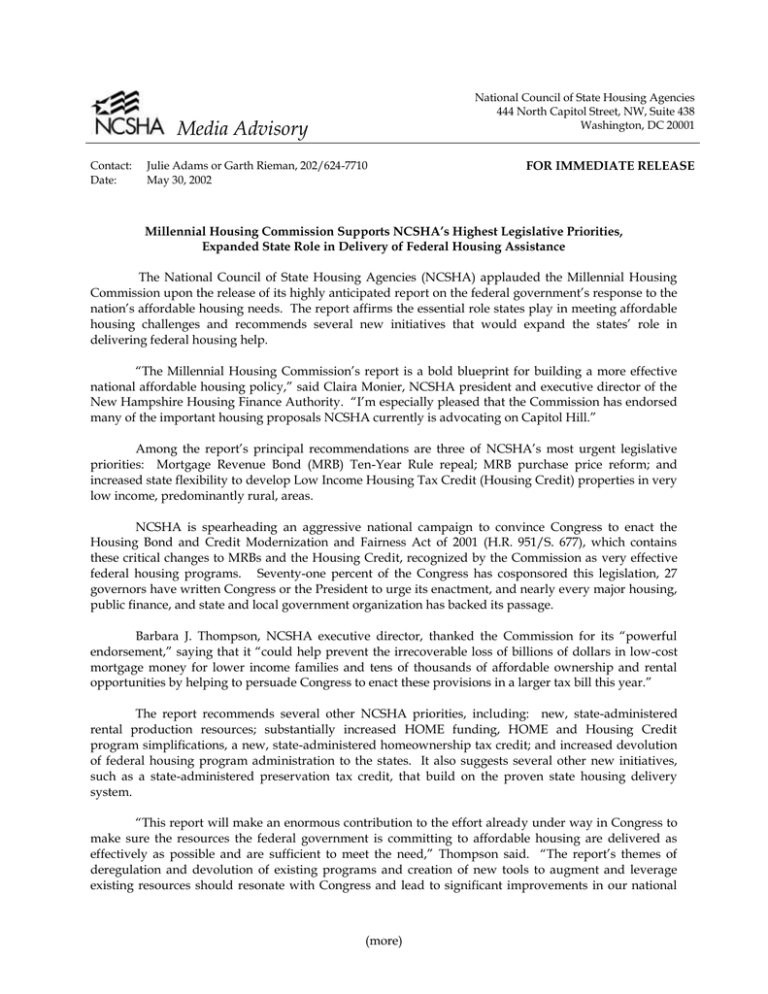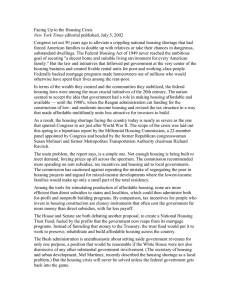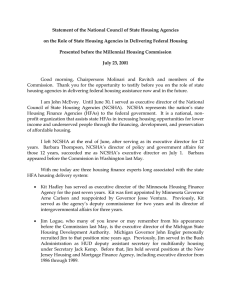Media Advisory
advertisement

National Council of State Housing Agencies 444 North Capitol Street, NW, Suite 438 Washington, DC 20001 Media Advisory Contact: Date: Julie Adams or Garth Rieman, 202/624-7710 May 30, 2002 FOR IMMEDIATE RELEASE Millennial Housing Commission Supports NCSHA’s Highest Legislative Priorities, Expanded State Role in Delivery of Federal Housing Assistance The National Council of State Housing Agencies (NCSHA) applauded the Millennial Housing Commission upon the release of its highly anticipated report on the federal government’s response to the nation’s affordable housing needs. The report affirms the essential role states play in meeting affordable housing challenges and recommends several new initiatives that would expand the states’ role in delivering federal housing help. “The Millennial Housing Commission’s report is a bold blueprint for building a more effective national affordable housing policy,” said Claira Monier, NCSHA president and executive director of the New Hampshire Housing Finance Authority. “I’m especially pleased that the Commission has endorsed many of the important housing proposals NCSHA currently is advocating on Capitol Hill.” Among the report’s principal recommendations are three of NCSHA’s most urgent legislative priorities: Mortgage Revenue Bond (MRB) Ten-Year Rule repeal; MRB purchase price reform; and increased state flexibility to develop Low Income Housing Tax Credit (Housing Credit) properties in very low income, predominantly rural, areas. NCSHA is spearheading an aggressive national campaign to convince Congress to enact the Housing Bond and Credit Modernization and Fairness Act of 2001 (H.R. 951/S. 677), which contains these critical changes to MRBs and the Housing Credit, recognized by the Commission as very effective federal housing programs. Seventy-one percent of the Congress has cosponsored this legislation, 27 governors have written Congress or the President to urge its enactment, and nearly every major housing, public finance, and state and local government organization has backed its passage. Barbara J. Thompson, NCSHA executive director, thanked the Commission for its “powerful endorsement,” saying that it “could help prevent the irrecoverable loss of billions of dollars in low-cost mortgage money for lower income families and tens of thousands of affordable ownership and rental opportunities by helping to persuade Congress to enact these provisions in a larger tax bill this year.” The report recommends several other NCSHA priorities, including: new, state-administered rental production resources; substantially increased HOME funding, HOME and Housing Credit program simplifications, a new, state-administered homeownership tax credit; and increased devolution of federal housing program administration to the states. It also suggests several other new initiatives, such as a state-administered preservation tax credit, that build on the proven state housing delivery system. “This report will make an enormous contribution to the effort already under way in Congress to make sure the resources the federal government is committing to affordable housing are delivered as effectively as possible and are sufficient to meet the need,” Thompson said. “The report’s themes of deregulation and devolution of existing programs and creation of new tools to augment and leverage existing resources should resonate with Congress and lead to significant improvements in our national (more) housing policy. Now we need to make sure Congress hears and acts on these important recommendations.” Congress created the Commission in 1999 to review federal housing policy and programs and recommend ways in which they could be strengthened to better address the nation’s growing affordable housing needs. NCSHA is a national, nonprofit organization created by the nation’s state housing finance agencies to assist them in increasing housing opportunities for lower income and underserved people through the financing, development, and preservation of affordable housing. ### The Commission’s report is available at www.mhc.gov.




